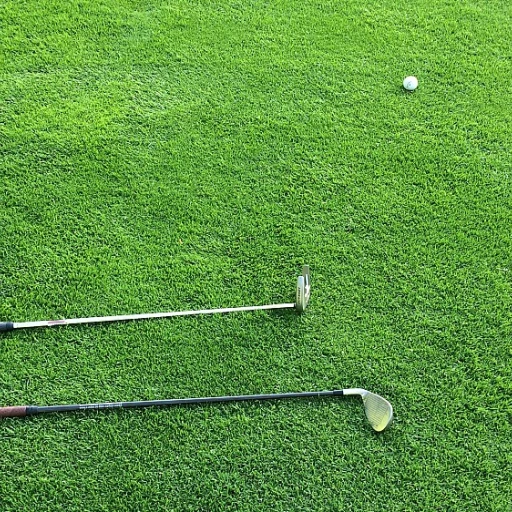Understanding the Average Time for 18 Holes
Deciphering the Typical Duration for a Complete Round
When you're stepping onto the lush greens, you might be curious about how long it typically takes to complete a round of 18 holes. While the numbers can fluctuate, understanding the average duration can help you plan your golfing day better. On average, playing 18 holes of golf usually takes around four to five hours. However, this can vary significantly based on various factors that we'll delve into further in subsequent parts.
These factors can lead to the experience being either a swift three-hour round or stretching beyond five hours. It's important to remember, the pace of play varies with each round, influenced by a multitude of elements such as group size and course difficulty. Typically, experienced golfers paired with an efficient caddy can navigate through the course more swiftly.
One crucial point to consider is the use of different golf balls. The choice of golf balls can have subtle yet significant impacts on the game duration as well. For those fascinated by how luxury editions can alter your game and potentially your timing, the
limited edition golf balls offer insights into how such products might come into play.
As you become more accustomed to the rhythm of golf, you'll notice how all these elements synchronize, affecting the time it takes to wrap up your game in style. Stay tuned for more details on how your tactical approach and other variables influence your round duration.
Factors Influencing Your Round Time
Considering Environmental Conditions
Playing conditions can greatly affect the time it takes to complete 18 holes of golf. Weather is a significant factor; for instance, windy days might extend playtime as you spend more time assessing shots and compensating for the wind. Similarly, rainy conditions can slow down both walking and cart travel.
Additionally, the course's geography plays a role. Courses with more challenging terrain or a higher number of hazards might take longer to navigate. Players who find themselves frequently dealing with water hazards or bunkers may find their rounds extended.
The Importance of Tee Time Management
Tee times are crucial in managing your day on the course. Starting earlier in the day can lead to a quicker round, as courses tend to get busier during the late morning and early afternoon. Playing during off-peak times can lead to shorter rounds as there are fewer groups clogging up the course.
Understanding Group Dynamics
The size and dynamics of your group can significantly influence your pace of play. Larger groups generally take longer to play 18 holes due to the additional players. Furthermore, the skill and experience of the players in your group can speed up or slow down the round.
Experienced golfers tend to play faster as they can execute shots more efficiently, while beginners may need more time. Additionally, players unfamiliar with golf etiquette or course rules, such as those found in the
personal life of a golf prodigy, might inadvertently slow down the group.
The Role of Golf Carts and Walking
The Influence of Golf Carts vs. Walking
When planning how much time you’ll need to play 18 holes, deciding between the use of a golf cart or walking can make a noticeable difference. Each mode of transport has its own set of advantages, and understanding them will help optimize your game time and overall experience.
Using a golf cart undoubtedly speeds up the round. For those who prefer efficiency or are playing on a larger course, a cart can save significant time between holes. This option is favored for convenience and is invaluable for golfers who may have difficulty covering longer distances on foot. However, one should also consider if any restrictions are in place for cart usage, which can sometimes affect the pace of play.
On the other hand, walking provides golfers a chance to enjoy the course's natural beauty and can be a more engaging experience. While it tends to increase round time, some players find that walking allows for better course management and strategic consideration. Embracing the journey on foot aligns with the tradition of golf and can be a rewarding choice for those who wish to immerse themselves fully in their surroundings.
For golfers interested in how pacing strategies impact game outcomes, the golf journey of dylan wu provides an insightful case study. Exploring how professionals incorporate walking and carts into their rounds can inform personal choices, enhancing your understanding of the game as a blend of luxury and athletic pursuit.
Ultimately, whether you choose to zoom around in a golf cart or enjoy a leisurely walk between the greens, it's important to consider how it meshes with your goals for the day. A well-planned approach that suits your playing style will significantly impact the pace and enjoyment of your round.
Tips for Speeding Up Play
Pacing Your Game: Tips to Reduce Total Time on the Course
When it comes to making sure your game doesn't drag on, there are several strategies you can implement to keep your pace brisk and enjoyable. These time-saving tips can not only help you complete your round in a timely manner but also enhance your overall golfing experience.
- Prepare Before You Tee Off: Arrive at the course with enough time to familiarize yourself with the layout and conditions. This preparation will allow you to anticipate challenges and make quick decisions on the fly.
- Play Ready Golf: Adopt the 'ready golf' approach, where the player who is prepared hits first, rather than strictly following the traditional honor system. This small adjustment can shave off valuable time, particularly during uncertain moments.
- Limit Practice Swings: While it’s essential to warm up properly, taking excessive practice swings can slow things down. Aim to limit yourself to one or two purposeful practice swings before each shot.
- Be Efficient on the Greens: When reading the green, take a quick glance at your putt from multiple angles but avoid lengthy contemplations. Confidence and decisiveness in your putting game are key to maintaining speed.
- Have a Pre-shot Routine: Develop a consistent pre-shot routine that prepares you swiftly. This routine should include selecting your club, assessing your target, and taking your stance—all within a reasonable timeframe.
- Walk with Purpose, Ride with a Plan: Whether walking or using a cart, move directly to your ball, keeping up with the group ahead. If you are in a cart, park it cleverly to minimize delays in getting to your next shot.
By incorporating these tips, you'll be more proactive in managing your round time, ensuring that a leisurely game doesn't turn into an all-day affair.
Impact of Skill Level and Experience
Experience and Its Influence on Your Golf Pace
When you're determining the time required to play 18 holes, the role of your skill level and experience cannot be overlooked. As they say, practice makes perfect, and this is especially true in the game of golf.
Experienced golfers, those who have played consistently over the years, tend to have a natural flow to their game. They understand the course, anticipate shots, and possess a level of comfort that allows them to play with a consistent rhythm. Their familiarity with different clubs and situational strategies can notably speed up their play. In contrast, beginners often require more time to assess the situation, select the right club, and practice their swings.
The Impact of Handicap Levels
Handicap levels are another aspect closely related to skill that impacts speed of play. Lower handicap golfers, often referred to as "scratch golfers," tend to play more efficiently because they can control the ball with precision. Their shot accuracy reduces the time spent recovering from wayward shots. On the other hand, those with higher handicaps might face more challenges that cause delays. If you're curious about the nuances of being a scratch golfer, you might find this article insightful:
introduction to handicap levels.
Improving your skill level not only enhances the enjoyment of the game but also tends to reduce the time spent on each hole, contributing to a more seamless playing experience. Working with a coach or joining golf clinics can be an excellent way to elevate your skills, potentially resulting in a faster round.
Remember, while honing your skills is essential, enjoying the game and maintaining its leisurely pace is equally important. After all, golf is as much about savoring the journey as it is about reaching the final hole.
USGA and Course Regulations
Regulations and their Impact on Pace
When discussing the intricacies of golf, one cannot overlook the influence of regulations, particularly those enforced by the USGA, and individual course guidelines. These regulations play a significant role in how long a typical round of 18 holes might take.
Firstly, USGA regulations are designed to ensure the game is fair and enjoyable for everyone. However, these rules can also influence how long players spend on the course. The time it takes to search for lost balls, adhere to etiquette, and maintain proper play sequences all have a cumulative effect on the duration of your round.
In addition to general rules, specific golf courses may have their own set of guidelines designed to facilitate more efficient play. For instance, many courses implement 'ready golf', a concept where players tee off as soon as they are ready rather than strictly adhering to the traditional honor system. This slight adjustment can notably speed up play and reduce delays.
Moreover, some courses might impose time limitations to help maintain a steady pace. This might include efforts like spacing out tee times to prevent overcrowding or implementing course marshals to oversee flow and assist players.
Ultimately, understanding and respecting these regulations and guidelines can contribute to a smoother and swifter golfing experience. While certain rules might seem cumbersome, they ultimately work to uphold the essence and enjoyment of the game for everyone involved.














